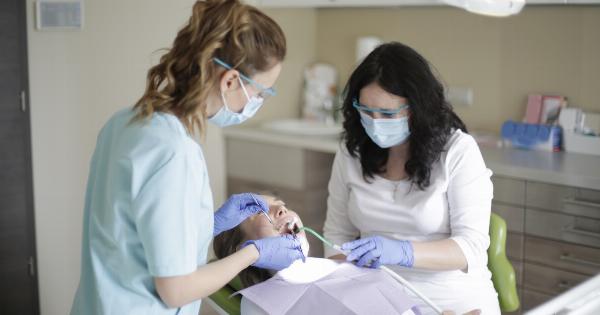Dealing with a sudden toothache can be extremely uncomfortable and even debilitating at times. Toothaches can occur unexpectedly and disrupt your daily activities, making it difficult to concentrate and perform regular tasks.
It is crucial to understand the common causes of sudden toothaches and how to manage the pain effectively. In this article, we will explore the various reasons behind sudden toothaches and provide tips on how to alleviate the discomfort.
1. Dental Decay (Cavities)
Dental decay, also known as cavities, is one of the leading causes of sudden toothaches.
When the enamel of your tooth deteriorates due to poor oral hygiene or excessive consumption of sugary foods and beverages, it leads to the formation of small holes or cavities. As the decay progresses, it can expose the sensitive inner layers of the tooth, resulting in pain and sensitivity.
To manage the pain caused by dental decay, it is important to visit your dentist. They will assess the extent of the decay and recommend the appropriate treatment, which may include dental fillings, root canal treatment, or extraction in severe cases.
In the meantime, you can alleviate the pain by rinsing your mouth with warm saltwater and using over-the-counter analgesics such as ibuprofen.
2. Gum Disease
Gum disease, also referred to as periodontal disease, is an infection of the gums and surrounding tissues.
It occurs when bacteria in dental plaque build up on the teeth and gums, leading to inflammation and potential damage to the supporting structures of the teeth. Gum disease can cause sudden toothaches, especially if it progresses to a more advanced stage known as periodontitis.
Managing the pain associated with gum disease involves addressing the underlying infection and inflammation. Your dentist may recommend professional cleaning to remove plaque and tartar buildup.
In severe cases, you may require gum surgery or other advanced treatment options. Practicing good oral hygiene, including regular brushing and flossing, is vital to prevent gum disease and alleviate associated toothaches.
3. Dental Abscess
A dental abscess is a collection of pus that forms within the teeth or gums. It usually occurs as a result of a bacterial infection and can cause severe tooth pain.
If left untreated, a dental abscess can lead to further complications and spread the infection to other parts of the body.
If you suspect a dental abscess, it is essential to seek immediate dental care. Your dentist will drain the abscess and may prescribe antibiotics to eliminate the infection.
It is important not to ignore a dental abscess, as the pain can worsen, and the infection can become life-threatening in rare cases.
4. Tooth Fracture
Fractured or cracked teeth can also cause sudden toothaches. The severity of the pain depends on the extent of the fracture and whether the inner layers of the tooth are exposed.
Tooth fractures can occur due to trauma, biting down on hard foods, or weakening of the tooth structure.
Treatment for a fractured tooth will depend on the location and severity of the fracture. Your dentist may recommend bonding, dental crowns, or root canal treatment to alleviate the pain and restore the tooth’s functionality.
In some cases, extraction may be necessary if the tooth cannot be saved.
5. Bruxism (Teeth Grinding)
Bruxism, or teeth grinding, is a condition in which an individual clenches and grinds their teeth, often involuntarily, while asleep or awake.
This habit can lead to toothaches and jaw pain, which is commonly felt upon waking up or during times of high stress.
To manage toothaches caused by bruxism, your dentist may recommend a custom-made mouthguard to protect your teeth from grinding during sleep.
Stress management techniques and avoiding certain foods and drinks (like caffeine and alcohol) can also help reduce teeth grinding. It is important to address bruxism, as it can lead to further dental complications, such as tooth fractures or temporomandibular joint disorders.
6. Dental Erosion
Dental erosion occurs when the tooth enamel is worn away by acid. This can happen due to excessive consumption of acidic foods and drinks, acid reflux, or certain medical conditions.
As the enamel erodes, the underlying sensitive layers of the tooth become exposed, leading to tooth sensitivity and sudden toothaches.
Managing toothaches caused by dental erosion involves identifying and controlling the source of acidity. Your dentist may recommend using fluoride mouth rinses or toothpaste to strengthen the tooth enamel.
Avoiding acidic foods and drinks, maintaining good oral hygiene practices, and addressing underlying medical conditions that contribute to acidity can all help manage dental erosion.
7. Sinus Infections
Surprisingly, sinus infections can also cause toothaches. The proximity of the sinuses to the upper teeth can result in referred pain, making it difficult to identify the exact source of the discomfort.
Sinus-related toothaches often come with other symptoms like nasal congestion, facial pressure, and headaches.
To manage toothaches linked to sinus infections, it is important to treat the underlying sinus issue. Over-the-counter pain relievers may help alleviate the discomfort temporarily.
If the sinus infection persists, seeking medical treatment from a healthcare professional may be necessary.
8. Impacted Wisdom Teeth
Impacted wisdom teeth, also known as third molars, can cause sudden toothaches and significant discomfort.
When these teeth do not have enough space to fully emerge or develop normally, they can become impacted, leading to pain, swelling, and infection.
If you suspect that your wisdom teeth are causing toothaches, it is advisable to consult with a dentist or oral surgeon. They will assess the situation through dental examinations and X-rays.
In many cases, the extraction of impacted wisdom teeth is recommended to alleviate pain and prevent further dental complications.
9. Temporomandibular Joint (TMJ) Disorders
Temporomandibular Joint (TMJ) disorders can cause toothaches and jaw pain. TMJ disorders occur when there is dysfunction or misalignment of the jaw joint and the muscles surrounding it.
This can result from various factors, including teeth grinding, jaw clenching, or trauma to the jaw.
Managing toothaches associated with TMJ disorders involves addressing the underlying cause of the dysfunction.
Your dentist may recommend a range of treatment options, including jaw exercises, stress management techniques, and the use of a nightguard to prevent teeth grinding. In severe cases, dental procedures or orthodontic treatment may be required to correct the jaw alignment and alleviate the pain.
10. Tooth Sensitivity
Tooth sensitivity is a common condition that can cause sudden and sharp toothaches. It occurs when the protective layer of enamel wears down or the gums recede, exposing the sensitive dentin layer underneath.
Tooth sensitivity can occur due to various factors, such as aggressive brushing, gum disease, dental erosion, or teeth grinding.
To manage tooth sensitivity and the resulting toothaches, it is essential to identify and address the underlying cause. Your dentist may recommend desensitizing toothpaste or fluoride treatments to alleviate the discomfort.
Avoiding triggers, such as extremely hot or cold foods, can also help manage tooth sensitivity and prevent sudden toothaches.


























